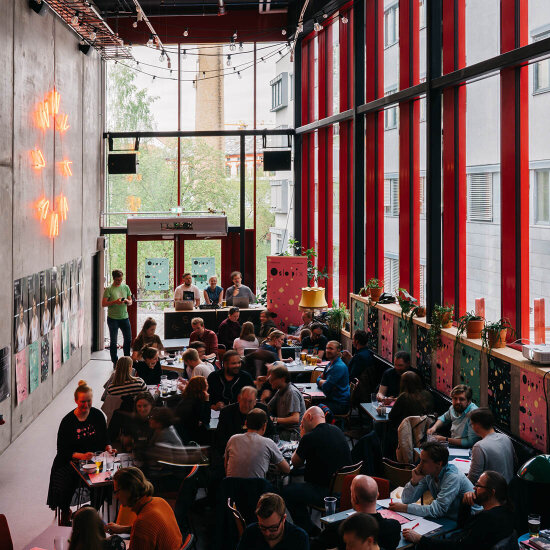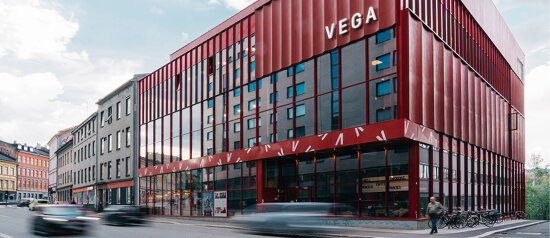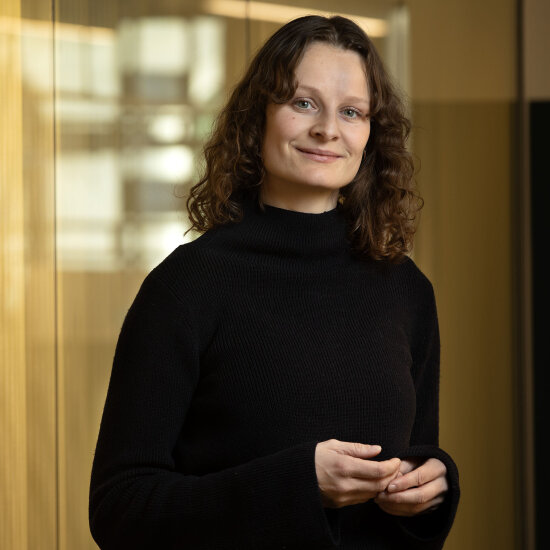A small plot with a troubled history. This is the background to the development of Hausmanns gate 28 in the centre of Oslo.
The driving forces of Vega spent three years planning the project in collaboration with the city of Oslo and Urbanium Eiendom. The idea was to create an independent arthouse cinema and a theatre for the production and performance of new Nordic drama.
Creating space for diverse activities
The developers had a tight financial framework. They wanted a building where different activities could happen simultaneously without getting in each other’s way. In addition, the building needed to be open and inviting as well as breathing new life into a neglected street scene.
The architects of Asplan Viak understood the area’s challenges. They created a building with a clear, strong expression well-adjusted to the urban environment. They did this by using robust, simple materials and by creative exploitation of space and light.
The result is a building with an honest, down-to-earth expression and a diverse interior. Recycled materials and furniture contribute to reinforcing this image.


Pioneering roof garden with local flora
The innovative blue-green roof was created as a result of a collaboration between Asplan Viak’s landscape architects, the Norwegian Institute of Bioeconomy Research (NIBIO), Protan, Ljono Stauder, Bergknapp AS and – not least – a dynamic developer, Urbanium. Together they developed a new soil mix, and with it a native flora based on seeds collected alongside the Oslo Fjord.
Pioneering roof garden with local flora
The innovative blue-green roof was created as a result of a collaboration between Asplan Viak’s landscape architects, the Norwegian Institute of Bioeconomy Research (NIBIO), Protan, Ljono Stauder, Bergknapp AS and – not least – a dynamic developer, Urbanium. Together they developed a new soil mix, and with it a native flora based on seeds collected alongside the Oslo Fjord.

The plants and insect population are inspected annually as part of a research project led by Asplan Viak and NIBIO. The research forms the basis of other roof gardens by Asplan Viak, both those already established and others in the process of being created – for example Kristian August gate 13 and the new Government Quarter.
The blue-green roof contributes to increased biodiversity in the city and is an important climate change adaptation feature in that it is developed to deal with future extreme precipitation events. The Norwegian Water Resources and Energy Directorate (NVE) have a research project and a measuring station keeping an eye on the water management.
The experiences from the project are shared so that they may benefit other construction projects.
Vega Scene: Independent cinema and a theatre for new drama
By: Asplan Viak, Vega Scene, Urbanium Eiendom and more
Design disciplines: Architecture, Interior architecture, Landscape architecture, Urban development
Recipient of the DOGA Award
This project has received the DOGA Award for Design and Architecture for its outstanding qualities and for showing how strategic use of design and architecture create important social, environmental and economic value.
These are three reasons why this is an exemplary project:
- Green culture venue
Vega Scene is the first culture venue given the BREEAM-NOR-certification [environmental certification for buildings]. - A boost for the local community
The project has transformed the cityscape. What was previously a dark street full of traffic has been lit up, both by the architecture and by the street life.
- Research on blue-green roofs
The blue-green roof of Vega Scene boosts the biodiversity and assists with the management of surface water. Lessons drawn from this development will benefit many other developers in the future.


